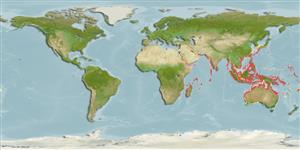Gastropoda |
Neogastropoda |
Olividae
Environment: milieu / climate zone / djupintervall / distribution range
Ekologi
; djupintervall 0 - 30 m (Ref. 101024). Tropical
Indo-West Pacific: from East Africa to eastern Melanesia; north to Japan and south to southern Queensland and New Caledonia.
Length at first maturity / Size / Weight / Age
Könsmognad: Lm ? range ? - ? cm Max length : 4.0 cm SHL hane/ej könsbestämd; (Ref. 349); common length : 3.0 cm SHL hane/ej könsbestämd; (Ref. 349)
Mainly collected for its shell; common (Ref. 349). Minimum depth assumed from its ecology. It is found in littoral (Ref. 128042), and shallow subtidal zones. Burrows in sand flats (Refs. 349, 128042). On dark sands at night (Ref. 799). In general, members of the family Olividae are carnivores (Ref. 67623).
Life cycle and mating behavior
Könsmognad | Reproduktion | Lek | Eggs | Fecundity | Larvae
This species is a non-broadcast spawner. Life cycle does not include trocophore stage. Also Ref. 833.
Poutiers, J.M. 1998 Gastropods. p. 363-648. In Carpenter, K. E. and V. H. Niem. 1998. FAO species identification guide for fishery purposes. The living marine resources of the Western Central Pacific. Volume 1. Seaweeds, corals, bivalves, and gastropods. Rome, FAO. (Ref. 349)
IUCN Red List Status
(Ref. 130435: Version 2025-1)
CITES status (Ref. 108899)
Not Evaluated
Not Evaluated
Threat to humans
Harmless
Human uses
| FishSource |
Verktyg
Ytterligare information
Trophic EcologyFood items (preys)
Födosammansättning
Födointag
Predatorer
Population dynamicsTillväxtMax. ages / sizesLength-weight rel.Length-length rel.Length-frequenciesMass conversionAbundans PhysiologySyreförbrukning
Human RelatedStamps, coins, misc.
Internet-källor
Estimates based on models
Preferred temperature
(Ref.
115969): 24.7 - 29.3, mean 28.5 (based on 3287 cells).
Fishing Vulnerability
Low vulnerability (10 of 100).
Price category
Unknown.
